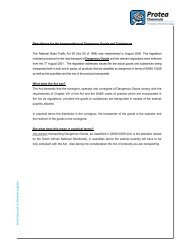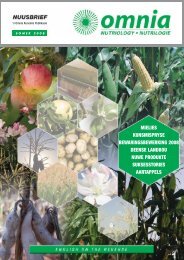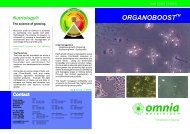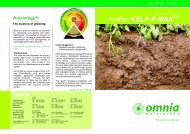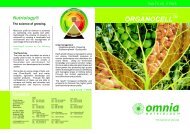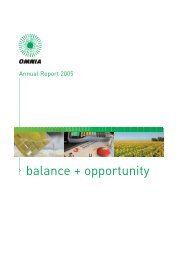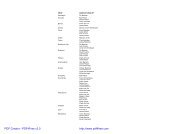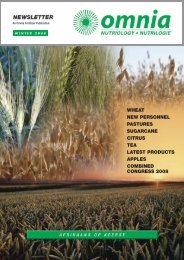omnia holdings annual report 2010 omnia holdings annu
omnia holdings annual report 2010 omnia holdings annu
omnia holdings annual report 2010 omnia holdings annu
You also want an ePaper? Increase the reach of your titles
YUMPU automatically turns print PDFs into web optimized ePapers that Google loves.
(2009: 1 107,4 cents), and headline earnings per share fell<br />
to 80,6 cents (2009: 1 114,2 cents).<br />
Total running expenses net of other income decreased by 6%<br />
to R1,1 billion (2009: R1,2 billion).<br />
Carbon credits, generated since 2008, were sold for the first<br />
time during the year under review.<br />
Chemicals<br />
Protea Chemicals operated in a challenging environment<br />
characterised by decreasing commodity prices and a<br />
strengthening rand, which squeezed margins and resulted in<br />
the write-down of higher priced stocks in the polymers business.<br />
Revenue contracted by 26% to R3,3 billion (2009: R4,5 billion)<br />
with a corresponding reduction in operating profit of 23% to<br />
R152 million (2009: R198 million). The operating profit margin<br />
was maintained at 4,5%. However, if the profit on contribution<br />
of business to Nalco is excluded, this fell to 4%.<br />
The assets of the EcoGypsum plant, which commenced<br />
production during the 2009 financial year and produces<br />
gypsum for cement manufacture and use in cement board<br />
(EnviroGypsum), were incorporated into Protea Chemicals<br />
during the year. This gave the chemicals business full financial<br />
responsibility for this manufacturing unit.<br />
The acquisition of Highchem in East Africa and its incorporation<br />
into the polymers business was concluded. However, production<br />
problems at Sasol Polymers, a key supplier to the business,<br />
negatively impacted results.<br />
During the year, the Group acquired Petroleum Fine Products.<br />
The company produces petroleum jelly, a mainstay product in<br />
the consumer care field, and technical oil. The business will be<br />
integrated into Protea Chemicals’ Consumer Care division.<br />
The acquisition is in line with the Group’s strategy to strengthen<br />
vertical integration within Omnia’s businesses to improve<br />
margins. It is consistent with the Group’s stated intention to<br />
reinforce the chemicals business through an increased focus<br />
on product manufacturing, rather than confining its activities<br />
to distribution. This will enable Omnia to take advantage of<br />
opportunities within its areas of interest as they arise.<br />
Mining<br />
With the decline in global demand during the second half of the<br />
2009 financial year for many of the commodities mined within<br />
South Africa, several of the Mining division’s major customers<br />
cut back production. This had a knock-on effect on purchases<br />
of explosives, which decreased orders placed with the Group.<br />
The price of ammonium nitrate, one of the main raw materials<br />
of explosives manufactured by Omnia, declined sharply in<br />
late 2008, after reaching record highs. This resulted in margins<br />
being squeezed.<br />
Sales of mining chemicals were disappointing with volumes,<br />
particularly to uranium mines, not meeting expectations.<br />
However, this decline is expected to be temporary as global<br />
energy demand drives the demand for uranium used in nuclear<br />
energy plants.<br />
The diversified nature of its activities shielded the Mining<br />
division from the worst effects of the recession until markets<br />
OMNIA ANNUAL REPORT <strong>2010</strong> 19<br />
began to improve towards year end. Revenue for the period<br />
reduced by 16% to R1,8 billion (2009: R2,1 billion). Operating<br />
profit of R212 million (2009: R269 million) was 21% below that<br />
of an extraordinary 2009 financial year, with the operating margin<br />
declining marginally from 12,7% for the year ended 31 March<br />
2009 to 11,9% for the year under review.<br />
The slow but steady rally in commodity prices, which is being<br />
fuelled by demand for coal from the energy sector and<br />
developing countries such as China and India, bodes well for an<br />
improved performance in the next financial year. The demand<br />
for bulk explosives, although lower compared to last year, has<br />
shown good signs of recovery.<br />
The division commenced production of shocktube at the<br />
Losberg facility. This will add a new dimension to the company<br />
by enabling it to rapidly and flexibly respond to demand and<br />
deliver on customer orders as required.<br />
Volume growth and profitability will be assisted by the growing<br />
acceptance of shocktube technology for use in deep level<br />
mining. Traditionally dominated by standard “cap and cord”<br />
technology, this sector has begun to appreciate the advantages<br />
of shocktube technology, which include safety improvements,<br />
better control of explosions and higher ore yield.<br />
BME, which has led the field in the use of shocktube technology<br />
in open cast mines, is well positioned to benefit from<br />
this transition and is expected to substantially increase its<br />
market share.<br />
Another example of BME leading innovation in explosives<br />
application technology, is its home-grown development of<br />
electronic delay detonator technology. Rated as one of the most<br />
advanced systems of its type in the world, this user-friendly<br />
system will enable mines to make further safety gains, reduce<br />
ore extraction costs, and increase operational efficiency and<br />
productivity.<br />
Agriculture<br />
During the <strong>2010</strong> financial year, fertilizer selling prices decreased<br />
significantly by an average of 35%. As a result, divisional<br />
revenue fell by 17% to R3,7 billion (2009: R4,5 billion). Due to<br />
the challenging trading conditions and inventory write-down<br />
detailed previously, an operating loss of R85 million was<br />
recorded for the period (2009: R410 million profit).<br />
The market conditions that led to farmers stockpiling fertilizer<br />
began to abate as raw material prices returned to more realistic<br />
levels, bringing some stability to a previously highly volatile<br />
market. During the current financial year, farmers reverted to<br />
traditional buying patterns and confidence has returned to the<br />
industry as a result of good maize crops. Sugar production,<br />
which has been ramped up to take advantage of high prices,<br />
will add impetus to sales.<br />
As Omnia is one of only two South African suppliers of a<br />
complete range of granular, liquid and speciality fertilizers, the<br />
benefits of a recovery in agricultural prosperity will be significant.<br />
The division will continue to support growth within the<br />
agricultural sector by assisting farmers with the technical<br />
expertise required to increase crop yields and improve the<br />
fertility of their soil. Omnia’s ability to offer its customers



